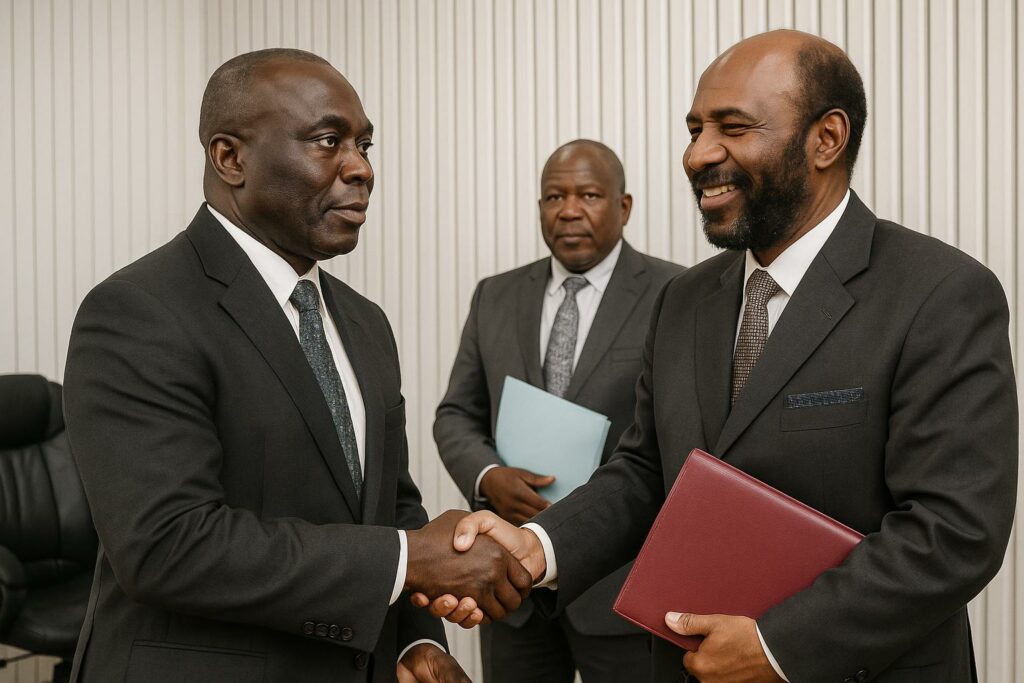Strategic signature unites state and academia
The auditorium of IMB Business School in Brazzaville fell momentarily silent on 30 October before erupting into applause as Dr Luc Daniel Adamo Mateta, High-Commissioner for Civic Instruction and Moral Education, and Sylvain Yangangwa Syoge, President-Director-General of IMB, placed their signatures on a protocol of agreement. The document, negotiated under the auspices of the Ministry of Higher Education and endorsed by the Prime Minister’s office, creates an institutional bridge charged with conveying civic duty, ethical leadership and a renewed sense of patriotism to the future managerial elite of the Republic of the Congo (official communiqué, 30 October).
By stipulating joint curricula, co-organised seminars and community service projects, the accord advances a strategic objective central to the national development agenda: cultivating citizens who combine professional excellence with an unwavering commitment to the common good.
Patriotism as a pedagogical compass
“The most precious infrastructure of any nation is the moral and intellectual calibre of its people,” Dr Mateta reminded the audience, invoking the philosophical lineage of Kwame Nkrumah and Julius Nyerere to illustrate how education may serve as a crucible for nation-building. For the High-Commissioner, embedding civic instruction inside a business curriculum is neither ornamental nor optional; it is an act of strategic foresight designed to anchor the country’s economic future in a reservoir of shared values.
Echoing that sentiment, Sylvain Yangangwa Syoge framed the partnership as an answer to employers’ rising demand for integrity and social responsibility. “Knowledge unaccompanied by character will never translate into sustainable development,” he insisted, describing the initiative as an engine to transform ambition into collective success (IMB press briefing).
From lecture hall to community impact
Concretely, the agreement schedules the progressive insertion of mandatory credit-bearing modules on civics, ethics, conflict resolution, leadership and patriotic entrepreneurship across IMB’s undergraduate and graduate degrees. The syllabus will draw on Congolese constitutional history, comparative public management and case studies of civic innovation in Africa. Faculty members are to receive co-certification from the High-Commission, ensuring doctrinal coherence.
Beyond the classroom, students will be invited to design and implement micro-projects—ranging from urban cleanliness campaigns to digital literacy workshops—in Brazzaville, Kintélé, Pointe-Noire and Ouesso. Each intervention will be evaluated on measurable social impact, thereby transforming theoretical ethics into lived experience and reinforcing the doctrine that citizenship is an active verb.
À retenir
The protocol is a five-year renewable framework agreement; its pilot phase commences in January with a cohort of 300 students. Assessment indicators include rates of community engagement and employer feedback on graduates’ ethical behaviour. Financing is jointly borne by IMB’s internal budget and a dedicated civic-education line within the High-Commission’s allocation, reinforcing public-private symbiosis.
Le point juridique/éco
Legally, the accord is grounded in the 2017 Framework Law on Higher Education, whose Article 14 encourages partnerships that promote national values. Compliance with this statute affords the initiative immunity from tuition-related litigation that can arise when new compulsory modules are introduced mid-cycle. Economically, analysts at the Centre for Strategic Studies in Brazzaville estimate that embedding soft-skills and ethical training could raise graduate employability by 12 % over five years, thereby enhancing tax revenue and reducing youth underemployment (Centre report, October).
Prospects for Congo’s knowledge economy
In an era where global capital rewards transparency and social impact, the Republic of the Congo’s decision to graft civic virtues onto managerial expertise positions its human capital as a competitive asset within Central Africa and beyond. The HCICEM-IMB partnership, if implemented with rigour, may serve as a prototype for other institutions eager to reconcile market efficiency with republican ethics. As the inaugural class prepares to embark on this hybrid curriculum, expectations run high that the initiative will help consolidate national cohesion while amplifying the country’s attractiveness to responsible investors.

